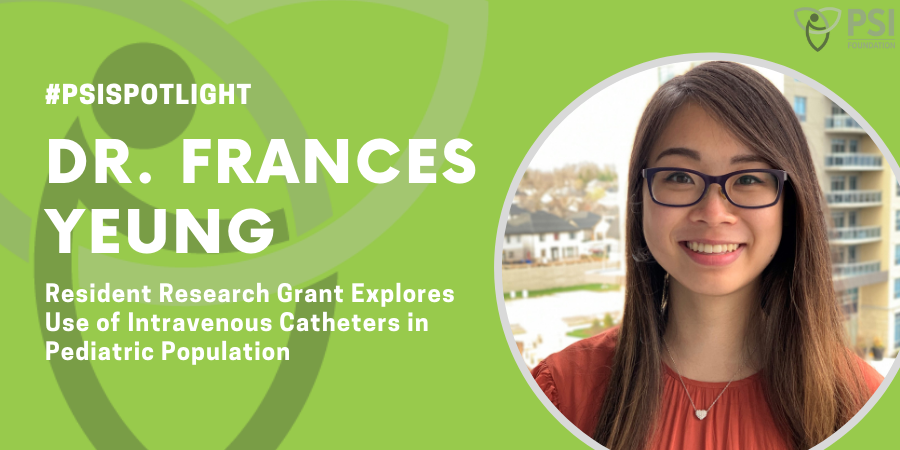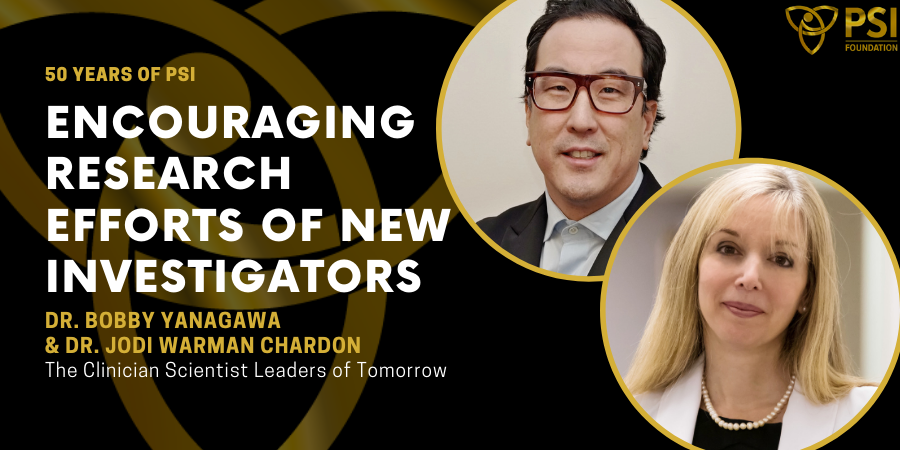Dr. Frances Yeung, a former pediatric resident at London Health Science Centre (LHSC), says her PSI Resident Research Grant was not only critical for her resident project, but also for putting her on the path of a research career.
“It piqued my interest in research. Prior to this, I didn’t know if I wanted to incorporate research into my future career,” says Dr. Yeung, now a clinical fellow at The Hospital for Sick Children. “Now I have more confidence and the knowledge to do so.”
Dr. Yeung led an ambitious, methodologically intense project for any resident – a clinical trial comparing two approaches to maintain a peripheral intravenous catheter (PIVC) in children.
PIVCs are essential for delivering fluids and treatments into a patient’s bloodstream, and because they can be painful and time-consuming to insert, health care providers try to make these devices last as long as possible. Two approaches are currently commonly used: “to keep vein open” (TKVO), which is a continuous low infusion of fluid through tubing, and a saline-lock, which “locks” a small amount of saline into the PIVC and requires no other tubing.
Dr. Yeung and her supervisor, Dr. Sepideh Taheri, saw that there was a lack of guidance around which method to use. Different countries, provinces and even centres differ in their preferred method.
For example, saline-lock is commonly used in Manitoba, where Dr. Yeung did her first-year residency, and in the United Kingdom, where Dr. Taheri worked prior to coming to Ontario. But at the Children’s Hospital at LHSC, where they worked together, TKVO was used most often.
In reviewing the literature, they found that very little research had been done to determine which approach should be used. Previous research had been based in the neonatal intensive care unit (NICU), but no studies had been done in the pediatric population.
The research in the NICU suggested that saline-lock made it easier for parents to care for their babies and reduced the risk of strangulation from tubing, reduced the burden on nurses to check the PIVC, and likely resulted in cost savings, but the big question – how long each approach maintains the PIVC in pediatric patients – was unclear.
Clinical trial is recognized nationally and changes practice locally
With a PSI Resident Research Grant, Dr. Yeung led a clinical trial comparing TKVO and saline-lock to determine how long each method maintained the PIVC in children from newborns to 17 years old. For three months, every child who was enrolled in the study received TKVO. This was followed by three months where every child who was enrolled had a saline-lock. The research team measured how long each PIVC remained patent, as well as collected data on complications and patient and caregiver satisfaction.
Importantly, they found that the two approaches were not significantly different in how long they maintained the PIVC, complications from PIVC, and patient and caregiver satisfaction.
“It was an important result that there was no difference between the two in the length of time that the IV lasted,” says Dr. Yeung. “And we know that saline-lock has those additional benefits, so hopefully other pediatric centres across Canada will consider moving toward using it.”
The study results have strong potential to help guide physicians’ decision-making, and Dr. Yeung and Dr. Taheri have presented the results at hospital rounds, conferences and national webinars to increase awareness. In LHSC, they noticed that practice is already starting to change, with more pediatricians and nurses choosing to use saline-lock for their patients.
In particular, Dr. Yeung presented at the National Pediatric Resident and Fellow Research Competition in 2019 and won the resident category. Her research stood out, in part, because of the more intense research methodology involved in a clinical trial.
Support from her supervisors in developing the trial and from PSI to fund the trial were key to her success. PSI Resident Research Grants are unique in that they require the trainee to be the principal investigator on the grant and perform the majority of the research, preparing them for future careers as clinician scientists.
“A clinical trial can be difficult to accomplish and requires so many resources, and many residents take on projects that are less intense in their methodology. The PSI grant definitely gave me more confidence in completing my own research and working through the methodology with my supervisors,” she says. “Before this trial, I had never been involved in such a big study, and it has helped me develop stronger skills in research methodology and clinical trials. Now I have the confidence to move forward in this career.”



